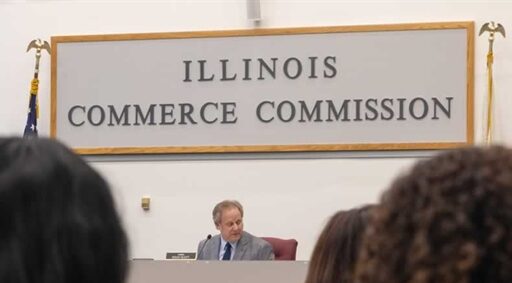After being rebuffed by regulators, utilities file slimmed-down spending plans

CHICAGO — State regulators are once again considering massive electric utility spending plans that would affect the state’s climate goals – and 5.4 million electric customers’ monthly bills – after rejecting previous versions late last year.
The Illinois Commerce Commission forced the state’s two major electric utilities, Commonwealth Edison and Ameren Illinois, back to the drawing board in December when it rejected the companies’ multi-year grid plans on a 4-1 vote. The rare split decision cited a lack of transparency and unclear benefits to customers among other reasons for the rejection.
The plans – products of the state’s Climate and Equitable Jobs Act – propose billions of dollars in spending and lay out the companies’ plans for supporting the state’s climate goals, including the transition away from greenhouse gas emitting energy generation over the next 20 years. The ICC is now reviewing the plans in a process likely to last the rest of the year.
Consumer advocates who cheered on the ICC’s decision to limit rate increases last year say they’re also reviewing the plans, which propose less spending than the ones that were rejected last year.
ComEd is asking for $7.6 billion in spending on grid improvements, a 10.7 percent decrease from their rejected plan. Ameren is seeking $1.88 billion in capital spending, about a 15.7 percent decrease from its previous request. The plans also include the companies’ operational spending, which would be similar to current levels.
Along with the grid plans, the two utilities are also filing rate plans to formalize the changes to customer rates and lay out some unrelated expenses.
In December, because the ICC lacks the authority to reject rate plans, the commission amended the utilities’ original filings and only approved the portion of the proposed changes to customer rates that didn’t involve grid spending. In a move praised by consumer advocates, the ICC tamped down the companies’ proposed profit margins from a 10.5 percent return on equity to below 9 percent for both companies.
“We heard the Commissioners’ concerns and have worked diligently these past three months to create a plan that is responsive to their feedback while positioning ComEd to help the state achieve its clean energy and equity goals,” ComEd President and CEO Gil Quiniones said in a news release.
Read more:State regulators once again flex muscle in rejecting utilities’ grid plans, lessening rate hikes
In its latest ICC filing, ComEd is proposing increasing residential customer bills by an average of $3.74 per month next year, with smaller increases in subsequent years. By 2027, the average residential customer could be paying about $92 more per year than they would be otherwise.
Ameren, which serves about 1.2 million electric customers, has not filed its rate plan. But based on the company’s grid plan, rates are likely be considerably lower than in their original filings, which would have raised annual residential costs by between $200 and $400 depending on electric use, according to public notices published early last year.
The updated filings, according to Environmental Law & Policy Center senior attorney Brad Klein, are a “major, major milestone” to getting utilities on track to support state climate goals.
The types of projects outlined in the company’s filings include plans related to solar energy, electric vehicles, battery storage, automating electricity distribution and making infrastructure more resilient to the impacts of climate change.
Klein noted he sees some efforts outlined in the plan as beneficial but hard to quantify, such as equitable access to solar energy. Other projects, like proposed upgrades to ComEd’s internet connections, might need to be scaled down to make the plans more affordable for consumers, he said.
“These all look like good projects, but there’s an overall cost at the end of the day,” Klein said.
In December, ICC Chair Doug Scott said the commission “cannot determine” if ComEd’s original plan was cost effective based on the information contained in the plans, later echoing the finding for Ameren’s plan as well.
The commission found the original plans lacked sufficient evidence that they would benefit low-income and traditionally disadvantaged communities – a requirement of CEJA – and that the plans didn’t demonstrate how the utilities would keep monthly bills affordable.
Both utilities explicitly responded to those criticisms in their revised filings, including more in-depth calculations that suggest most of the benefits of grid modernization and clean energy will go toward historically disadvantaged and low-income communities.
Since December, utilities have reworked the math they used to demonstrate their plans’ benefits and scaled back some spending.
“That has led to real savings,” Klein said.
One of the major themes of Ameren’s revisions, according to Ameren’s vice president for regulatory policy Matthew Tomc, is lowering the rate of capital spending. He said that was in response to feedback from advocates and the ICC’s December decision.
“We really see the approval of this plan as critical to providing reliable and affordable service to our customers as well as achieving the clean energy objectives of CEJA,” Tomc told Capitol News Illinois.
But he noted while the company reduced the spending in this plan by over $400 million, the projects that were cut or reduced might come back in future plans.
“Going forward, we’re going to look to the potential need to increase those investment levels,” Tomc said.
Consumer watchdogs are still analyzing the full details of the revised plans.
“That’s kind of what we’re really curious to see in the filing: Are the utilities explaining what they did originally and using different terms or are they actually changing what they’re doing?” Sarah Moskowitz, head of the consumer advocacy group Citizens Utility Board, told Capitol News Illinois.
While CUB lawyers had not fully reviewed the filings as of Friday, Moskowitz said based on conversations she’s had with utility officials, she expects to support some of the revisions to the grid plans.
“But there will remain sticking points that we’ll probably oppose,” Moskowitz said.
The ICC also admonished the companies in December for failing to be transparent in their planning process. In response, both utilities held meetings with community members and advocacy groups earlier this year. Company officials also held weekly meetings with each other to discuss how to handle revisions to their grid plans.
This engagement strategy, and the ICC’s rejection of earlier plans, was met with praise from some of those involved. Klein noted “the process is working well.”
“I think we’ve made a ton of progress,” he said.
Now, the ICC will consider whether the companies’ arguments meet the requirements laid out in state law. Regulators are expected to issue a ruling in these cases by the end of the year, after hearing testimony from consumer and environmental advocates, as well as from staff at the ICC and the Illinois attorney general.
Capitol News Illinois is a nonprofit, nonpartisan news service covering state government. It is distributed to hundreds of print and broadcast outlets statewide. It is funded primarily by the Illinois Press Foundation and the Robert R. McCormick Foundation, along with major contributions from the Illinois Broadcasters Foundation and Southern Illinois Editorial Association.
Miss Clipping Out Stories to Save for Later?
Click the Purchase Story button below to order a print of this story. We will print it for you on matte photo paper to keep forever.

